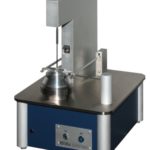MENUMENU

Ring Shear Testers are used for more than only flowability testing; they can also be used for quality assurance or product development. The Shear test is intended to help with hopper flow design. In order to accomplish mass flow and eliminate flow blockages, the test findings can be used to calculate hopper slope angles and outlet dimensions. By directly reading data from the RSTCONTROL programme, the new hopper design software imports flow parameters of bulk solids measured using Schulze Ring Shear Testers. A template for Microsoft EXCEL* can be used to enter results obtained with other tests. The software’s straightforward…

The Ring Shear Tester RST-XS.s is compact and bench-mounted. It is designed for applications with powders of up to particle size 1.5 mm. This RST is particularly well-suited for small sample volumes. The RST-XS is an easy-to-operate, computer-controlled tester for the precise determination of the flow properties of fine-grained powders and bulk solids. It is appropriate for those industries and research institutions which deal with either fine-grained materials or have only limited amounts of powders for testing (e.g. pharmaceutical, food, chemical industries and others). The tester measures the flowability and other physical quantities like the internal friction of a powder,…

The Ring Shear Tester RST-01.pc is floor mounted and designed for handling powders with large sample sizes. This includes coal, cereals, soil and other coarse materials. The RST-01.pc is suitable for all powders and bulk solids up to a particle size of 5-10 mm. It performs the tests automatically and is controlled by a PC and control software RST-CONTROL 95. Contact Us ENQUIRE CALL US LIVE CHAT * Live chat opening hours Mon – Fri 9:15 to 16:30 (UK Time)